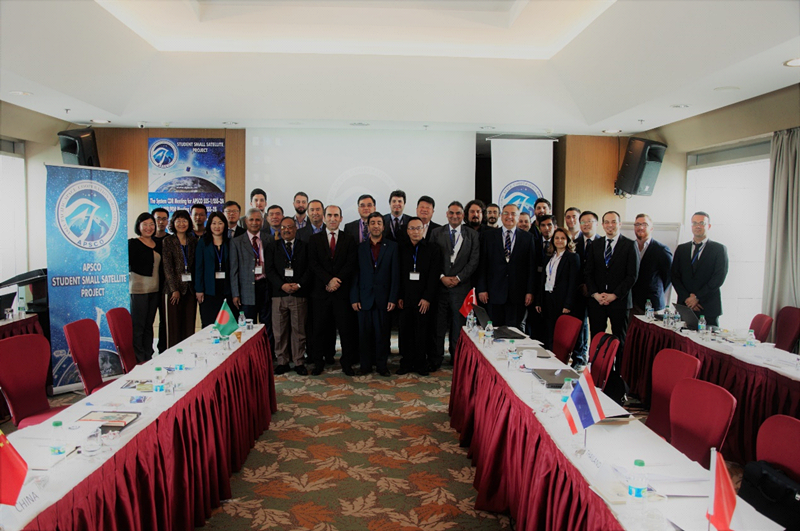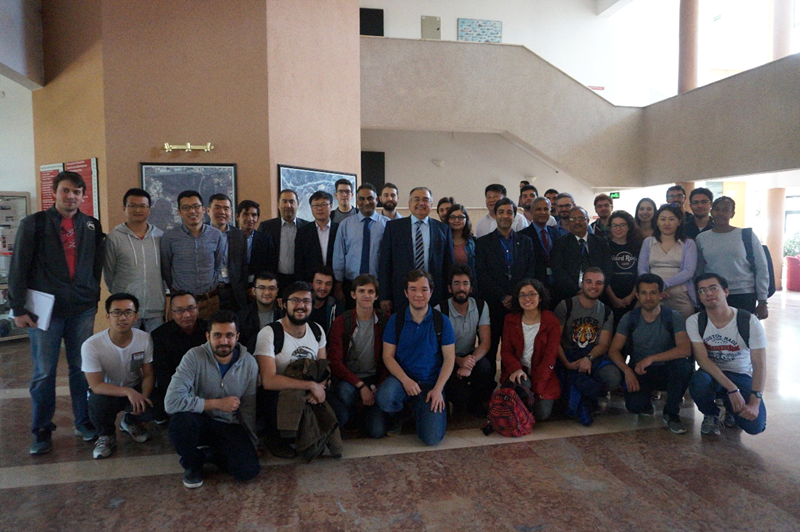The Technical Review
and Progress Review Meetings of APSCO Student Small Satellite (SSS)
Project was held during April 16-25,
2018 at
Ankara, Turkey. The delegation from Bangladesh, China, Iran, Mongolia,
Pakistan, Peru, Thailand and Turkey actively participated in the Meeting.
The meeting was
chaired by Dr. Mohammad Ebrahimi Seyedabadi, Direct-General of the ET&DM
Department of APSCO. More than forty (40)
delegates from APSCO Member States (MS) including the Program Management Board
(PMB) members, the Program Management Team (PMT) members, the project leading
universities, the Secretariat of APSCO and the invited experts,
participated in this review activity. Mr. Xu Yansong, Division Director for
International Affairs from CNSA also participated in the Meeting.

A total of seventeen (17) SSS-1
CDR documents, fifteen (15) SSS-2A
CDR documents, ten (10)
SSS-2B PRR documents and seventeen (17) SSS-2B PDR documents
were circulated by APSCO Secretariat and reviewed before the meeting by the PMB
Members, the PMT Members, the invited consultant and MS’s experts
independently. By reviewing the required documents, in total, three hundred and thirty-five (335)
Review Item Discrepancies (RIDs) were sorted and all RIDs and their
clarifications by the SSS-1, SSS-2A and SSS-2B teams were presented in detail
during the meeting. Frequency application, ground station network, summer camp
were fully discussed.
Beihang SSS-1 team is
led by Prof. Huang
Hai and Dr. Wang
Xinsheng from school of astronautics, Beihang University. The SSS-1 CDR
documents were provided by Beihang team. In addition, Beihang provided three
technical reports which described the detailed design of
structure, mechanism and thermal subsystem. Experts from MSs and the consultant
considered they basically reach the standard of CDR phase. This work provided a
good example for other MSs and laid a good foundation for
the critical design of satellite. During this meeting,
Prof. Huang Hai provided a presentation on the SSS-1 implementation progress.
He emphasized that many inputs were still pending for system critical design from
subsystem providers.
The Member
States have reached a
consensus that satellite launch work would be organized by China, and the
launch date is preliminarily expected in 2020. At present, the work of space
callsign application has achieved a preliminary achievement, while the
subsequent work is
undertaking orderly. Dr. Wang Xinsheng put forward the APSCO university ground
station network proposal, which received unanimous support from MSs. The APSCO
university ground station network is not only the necessary guarantee of
project success, but also has great significance for satellite application data
sharing among MSs.

The space technology
education and training is one of the key important tasks of SSS project.
Beihang organized the first small satellite technology summer camp in 2017,
which was of important guiding significance. The second summer
camp will focus on the micro-satellite
design and AIT. Turkey, the host country of second summer camp, introduced its
plan and invited participants to visit the middle-east university, which may be
the host university of the coming summer camp.
The Meeting was
successfully concluded and the action plan of 2018 was agreed by all MSs. The
experts expressed their gratitude to APSCO and TUBITAK-UZAY for their
hospitality and efficiency during the Meeting.
At present, the SSS
project is the largest basic activity project since the APSCO founded. CNSA, RCSSTEAP
and Beihang Univeristy have paid more attention to this project. It will not
only increase the MSs’ satellite design ability but also promote the space
technology exchange among MSs.

